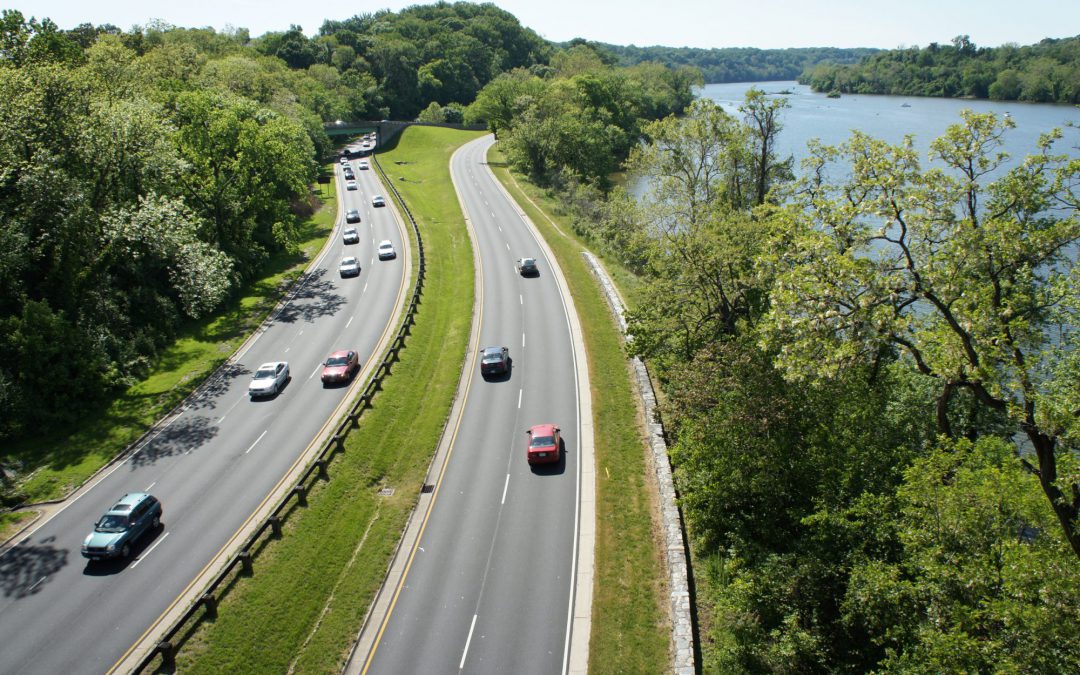WASHINGTON — Transportation policy expert Sarah Kline has done a lot of research on selling government assets to the private sector. But President Donald Trump’s proposal to sell the George Washington Memorial Parkway took her by surprise.
“You don’t hear free parkways come up too often,” Kline, a transportation consultant and former counsel for the Senate housing committee, said. “A road that exists today and doesn’t have an associated revenue source – basically, tolls – doesn’t look like something that the private sector would be super excited to take on.”
The parkway’s future was called into question with the February release of Trump’s infrastructure plan, which placed the road on a list of federally owned assets for potential sale to the private sector or transfer to state and local governments.
The move to sell federal assets is part of Trump’s infrastructure plan, which would provide $200 million in federal money over 10 years that he hopes would lure state and private infrastructure investment of $1.5 trillion. According to the plan, selling off certain valuable assets would give federal agencies money from the sales to invest in other infrastructure projects.
However, the plan immediately faced pushback, with critics branding it as short-sighted. Rep. Don Beyer, a Democrat whose Eighth Virginia Congressional District includes the busiest portion of the George Washington Parkway, is a fierce opponent.
“We think it’s a stupid idea,” Beyer spokesman Aaron Fritschner said. “The whole plan is pretty half-baked. It feels to me like homework that I completed at 3 a.m. in college because I had other things going on and my homework didn’t have my full attention.”
Robert Puentes, president and CEO of the ENO Center for Transportation, a transportation policy think tank, said the proposal is likely dead in the water. A private owner would have to put tolls on the road to cover costs and turn a profit – and that could bring a political price to politicians who would support the transfer or sale.
“There are a lot of barriers in the way,” Puentes said. “I just don’t see it happening anytime soon. It’s not impossible, but it would be a really big political risk.”
Owned and operated by the National Park Service, the parkway was built in stages between 1929 and 1970 as a recreational drive linking various historical sites in the D.C. area. However, it now also serves as a major commuting route – the busiest section, stretching from the Fairfax county line to Sprout Run Parkway in Arlington, carries 71,000 cars per day on average, according to Park Service data. That’s comparable to Interstate 66 traffic inside the Capital Beltway.
Agreeing with Puentes, Kline said a privatized parkway would almost certainly feature tolls.
“The idea of imposing tolls on the parkway is sure to cause a lot of outrage in the area,” Kline said. “It’s not that the road is free, but users aren’t used to paying out of pocket directly every time they get on the GW parkway.”
If the parkway is tolled, commuters would be hard-pressed to find a free alternative, Kline said. Many would likely end up on I-66, where newly instituted congestion price tolls for single-occupancy vehicles during rush hour have reached as high as $47 for the 10-mile stretch within the beltway.
“There’s [State Routes] 29 and 50, which go from western Fairfax County into D.C., but they have traffic lights,” Kline said. “I can see why you would look at this and be like, ‘Why is the National Park Service running a major commuter highway?’ but the solutions that are presented seemed odd.”
The plan’s alternative to a privately owned parkway is transferring it to the state of Virginia. Interior Secretary Ryan Zinke has said any land transfer would involve a land swap rather than simply selling off the land.
Kline said that Virginia might not even be interested in taking over the parkway due to the cost of upgrading and maintaining it. According to the National Park Service, the parkway had over $395 million dollars in needed maintenance as of Sept. 30, 2017.
Rep. Rip Sullivan, who represents the 48th district in Virginia’s House of Delegates, agrees.
“I think we would have a lot of questions as to what sort of funding comes – because the state doesn’t necessarily have the funding to maintain the GW parkway,” Kate Petersen, legislative assistant to Sullivan, said. “We’d have to see what that transfer would look like and what the funding mechanisms behind it would look like.”
In addition to the road, the National Park Service also owns the surrounding parkland. Trump’s proposal does not specify whether a transfer or sale would include the land. John Garder, senior director of budget and appropriations for the advocacy group National Parks Conservation Association, said “that real estate undoubtedly is very valuable.”
“Any nongovernmental entity would have a great deal of interest in building homes with significant scenic value,” he said.
The Department of the Interior did not provide details on the future of the parkway under Trump’s infrastructure proposal. However, Interior spokeswoman Heather Swift said in an emailed statement that Zinke “does not support the wholesale sale or transfer of federal land” unless required by law.
“Any potential transfer would be done via a land swap in order to better serve the people and the Park Service,” Swift said.
And Rep. Don Beyer’s spokesman said privatization will not “go anywhere in Congress.”
“The only good thing about this idea is that hopefully it’s never going to happen,” he said.


